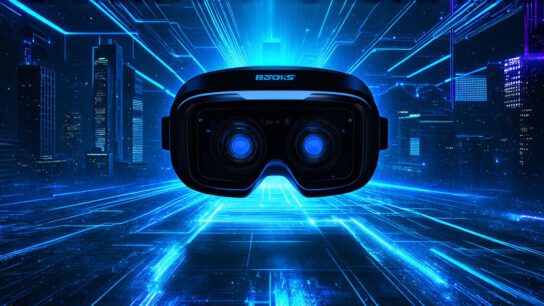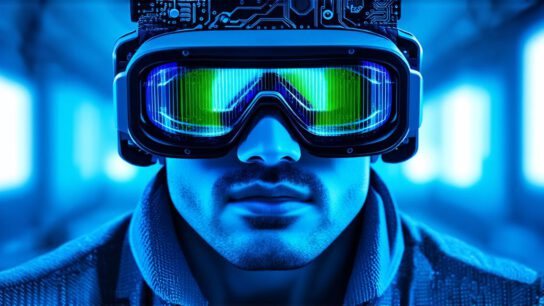Understanding Virtual Reality
Before we dive into the impact of VR, let’s first define what it is. VR refers to computer-generated simulations that create an immersive, interactive, and three-dimensional environment for users. This technology is achieved through various devices such as headsets, handheld controllers, and sensors that track movement.
Impact of Virtual Reality on Society
Virtual reality has the potential to revolutionize society by changing the way we interact with technology, each other, and even our own selves. Here are some of the ways in which VR is impacting society:
- Entertainment: VR technology has disrupted the entertainment industry, providing users with a more immersive and interactive experience than traditional media like movies or video games.
- Healthcare: VR technology has numerous applications in healthcare, including pain management, rehabilitation, and training. For instance, patients can use VR simulations to practice surgeries or other medical procedures, allowing them to gain experience without risking the lives of real patients.
- Education: Virtual reality has the potential to revolutionize education by providing a more interactive and immersive learning experience. Students can take virtual field trips to museums, historical sites, or even outer space, gaining knowledge through hands-on experiences.
- Automotive: The automotive industry is also embracing VR technology, allowing users to design and customize their cars virtually before making a purchase. This has led to an increase in personalization and customer satisfaction.
Impact of Virtual Reality on Technology
As virtual reality continues to evolve, it’s also impacting the way we develop and use technology. Here are some of the ways in which VR is changing technology:
- User experience: VR has raised the bar for user experience, providing users with a more immersive and interactive experience than traditional interfaces.
- Augmented reality (AR): VR technology has also led to the development of augmented reality, which overlays digital information onto the real world. AR has numerous applications in various sectors, including retail, manufacturing, and even entertainment.
- Artificial intelligence: Virtual reality has also impacted the development of artificial intelligence, allowing AI systems to interact with users in a more natural and intuitive way. For example, AI-powered virtual assistants like me can help you find information, answer questions, and even provide personalized recommendations.
- Cybersecurity: VR technology has also raised concerns about cybersecurity, as it creates new vectors for attackers to exploit. However, it’s also providing opportunities for cybersecurity experts to develop more advanced threat detection and response systems.
Case Studies and Personal Experiences
One of the best ways to understand the impact of virtual reality is through case studies and personal experiences. Here are some examples:
- The Virtual Reality Revolution in Retail: Lowe’s, a home improvement retailer, implemented a VR experience that allowed customers to visualize products in their homes before making a purchase. This led to a 40% increase in customer satisfaction and a 20% increase in sales.
- The Future of Healthcare Training: The Cleveland Clinic developed a VR training program for doctors, allowing them to practice surgeries and other medical procedures in a safe and controlled environment. This led to improved patient outcomes and reduced surgical errors.
- Virtual Field Trips: Google Expeditions, a free VR app, allows students to take virtual field trips to museums, historical sites, and even outer space. This has led to increased student engagement and a better understanding of the world around them.
군데 군데 사람들이 말하는 것처럼 개인 경험도 있습니다: 가상 현실 개발자로서, 가상 현실은 기술과 서로 상호 작용하는 방식을 변화시키는 데 어떻게 영향을 미쳤는지 직접적으로 경험할 수 있습니다. 가상 게임 디자이너나 가상 회의 공간을 만드는 것과 같은.
Research and Experiments
In order to fully understand the impact of virtual reality, it’s important to consider the research and experiments that have been conducted on this technology. Here are some key findings:
- Virtual Reality and Mental Health: A study published in Frontiers in Psychology found that VR therapy was effective in treating anxiety disorders such as PTSD and social phobia. The study also found that VR therapy had a positive effect on the brain, leading to increased activity in areas associated with emotional regulation.
- Virtual Reality and Pain Management: A study published in Pain Medicine found that VR therapy was effective in reducing pain levels in patients with chronic low back pain. The study also found that VR therapy led to improved mood and reduced anxiety levels in patients.
- Virtual Reality and Learning: Research has shown that VR-based learning experiences can improve knowledge retention, increase engagement, and enhance motivation. For example, a study published in the Journal of Educational Psychology found that students who learned through a VR simulation had better recall of information than those who learned through traditional methods.
- Virtual Reality and Cybersecurity: As mentioned earlier, virtual reality has raised concerns about cybersecurity. However, research has shown that VR technology can also be used to develop more advanced threat detection and response systems. For example, a study published in the Journal of Cyber Security found that VR simulations were effective in training cybersecurity professionals to detect and respond to threats.
Thought-Provoking Ending
As virtual reality continues to evolve, it’s important for developers to consider the impact that this technology has on society and technology. By understanding the potential benefits and challenges of VR, we can develop more immersive and interactive experiences that improve our lives in various ways. Whether it’s entertainment, healthcare, education, or even our mental health, virtual reality has the power to transform the way we interact with technology and each other.
FAQs
Here are some frequently asked questions about virtual reality:
- What is virtual reality (VR)?: Virtual reality refers to computer-generated simulations that create an immersive, interactive, and three-dimensional environment for users.
- How does virtual reality impact society?: Virtual reality has the potential to revolutionize society by changing the way we interact with technology, each other, and even our own selves. It has disrupted various sectors including entertainment, healthcare, education, and even the automotive industry.
- How does virtual reality impact technology?: Virtual reality has raised the bar for user experience, providing users with a more immersive and interactive experience than traditional interfaces. It has also led to the development of augmented reality, artificial intelligence, and cybersecurity.
- What are some examples of case studies and personal experiences related to virtual reality?: Some examples include Lowe’s implementing a VR experience for customers, the Cleveland Clinic developing a VR training program for doctors, and Google Expeditions allowing students to take virtual field trips.



